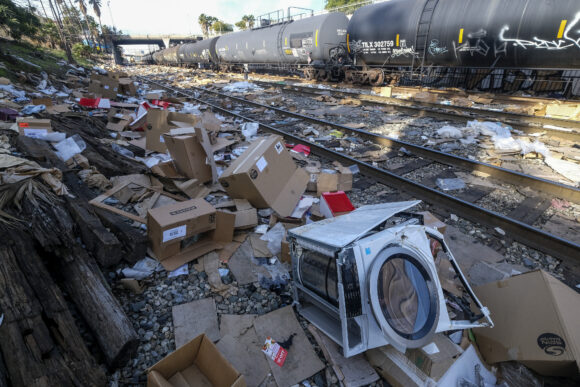A rash of railcar thefts in the Los Angeles area may have given a different impression, but nationally the number of reported cargo thefts dropped by 15% in 2021 compared to the prior year, according to CargoNet’s annual Supply Chain Risk Trends report.
The company, which is a division of Verisk, tracked 1,285 cargo thefts in the United States and Canada last year with reported losses of $57.9 million. That was down from 1,517 thefts and $66 million in losses in 2020.
Images of empty boxes pilfered from rail cars and strewn across railroad tracks received national attention in February. Union Pacific reported that rail thefts increased 160% in Los Angeles County in 2021 compared to the previous year.
But Keith Lewis, director of operations for CargoNet, said it is impossible to say how much that widely reported crime spree contributed to overall cargo theft numbers. He said the railroads have their own police departments and don’t always report thefts to law enforcement.
The number of reported cargo thefts in California, however, did show an uptick: 276 thefts in 2021 compared to 244 in 2020. The CargoNet report shows that electronic goods were taken in 99 of those California thefts.
No other state or province had anywhere near that number. Texas and Florida were the next highest, with 12 electronics cargo thefts each, according to the CargoNet report.
Electronics was the favorite target of cargo thieves last year, accounting for 180 of the 1,285 thefts in the US and Canada. That was up from 154 last year.
Household goods were the No. 1 target in 2020, with 202 reported cargo thefts. That dropped to 171 in 2021. The food and beverage category accounted for 125 cargo thefts in 2021, down from 194 in the prior year.
The CargoNet report shows one form of cargo theft declined sharply in 2021: The number of fictitious pickups — where a fraudster posing as a legitimate truck driver makes arrangements with a brokerage to pick up a load — dropped to 16 from 62 in 2020 and 36 in 2019.
Lewis said the COVID-19 pandemic likely contributed to the jump in fictitious pickups in 2020. He said the brokerages that match trucking companies with businesses that need to move freight don’t typically do a lot of screening because they have to move cargo fast. He said there was even less scrutiny during the 2020 lockdowns.
“Everybody’s working from home so the boss isn’t looking over your shoulder asking what are you doing,” he said.
Lewis said brokerages have learned that they shouldn’t assign a load of cargo to anybody who calls in with a Department of Transportation number, but mistakes still happen. He said he’s not sure fictitious pickups are always reported.
“They are getting better at vetting and when they do get hit they are embarrassed and don’t want to tell anybody,” he said. They suck it up and move on.”
Security appears to be a greater concern throughout the supply chain. Steve Diebold, export manager for American Casting and Manufacturing Corp., said in an email that there is a movement away from plastic and lighter stamped metal seals among shippers, especially those that are moving hazardous cargo, food and high-value goods.
“The users are just trying to replace something easily broken with a stronger seal that would force a would-be thief to bring bigger tools or pass by their truck or container because it is harder to open,” Diebold said. “Easier targets with less to cut are the most likely to be hit by thieves. Essentially that stronger ‘barrier’ seal becomes a one-time disposable lock and a visible theft deterrent.”
About the photo: Shredded boxes and packages are seen at a section of the Union Pacific train tracks in downtown Los Angeles Friday, Jan. 14, 2022. Thieves have been raiding cargo containers aboard trains nearing downtown Los Angeles for months, leaving the tracks blanketed with discarded packages. The sea of debris left behind included items that the thieves apparently didn’t think were valuable enough to take, CBSLA reported Thursday. (AP Photo/Ringo H.W. Chiu)
Was this article valuable?
Here are more articles you may enjoy.


 AI Got Beat by Traditional Models in Forecasting NYC’s Blizzard
AI Got Beat by Traditional Models in Forecasting NYC’s Blizzard  Tesla’s Austin Robotaxis Report 14 Crashes in First Eight Months
Tesla’s Austin Robotaxis Report 14 Crashes in First Eight Months  UK Floods Raise Specter of ‘Mortgage Prisoners’ Across Banks
UK Floods Raise Specter of ‘Mortgage Prisoners’ Across Banks  ‘Structural Shift’ Occurring in California Surplus Lines
‘Structural Shift’ Occurring in California Surplus Lines 